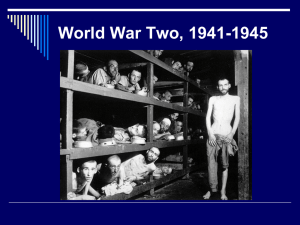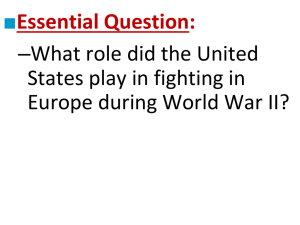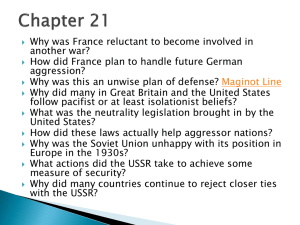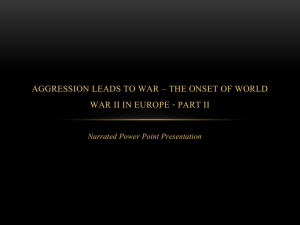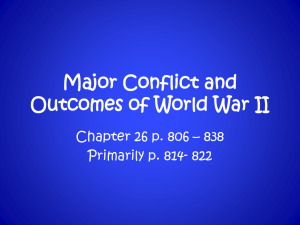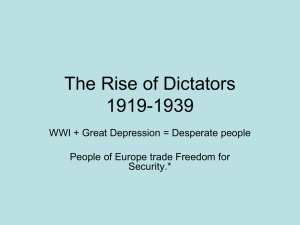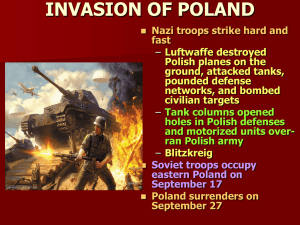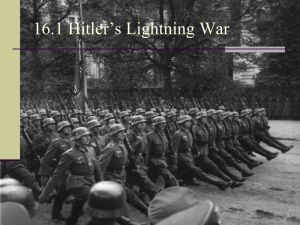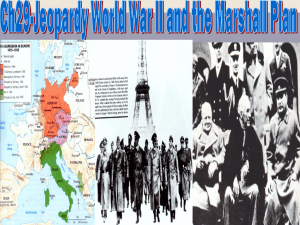WORLD WAR TWO IN EUROPE – a selective timeline
advertisement
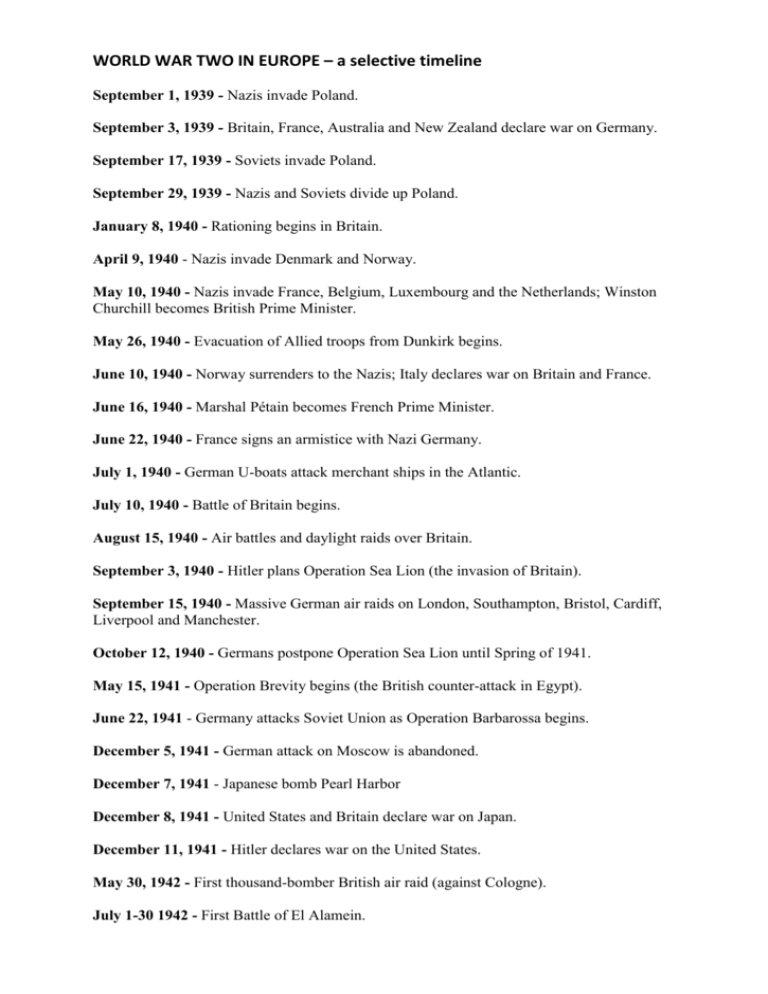
WORLD WAR TWO IN EUROPE – a selective timeline September 1, 1939 - Nazis invade Poland. September 3, 1939 - Britain, France, Australia and New Zealand declare war on Germany. September 17, 1939 - Soviets invade Poland. September 29, 1939 - Nazis and Soviets divide up Poland. January 8, 1940 - Rationing begins in Britain. April 9, 1940 - Nazis invade Denmark and Norway. May 10, 1940 - Nazis invade France, Belgium, Luxembourg and the Netherlands; Winston Churchill becomes British Prime Minister. May 26, 1940 - Evacuation of Allied troops from Dunkirk begins. June 10, 1940 - Norway surrenders to the Nazis; Italy declares war on Britain and France. June 16, 1940 - Marshal Pétain becomes French Prime Minister. June 22, 1940 - France signs an armistice with Nazi Germany. July 1, 1940 - German U-boats attack merchant ships in the Atlantic. July 10, 1940 - Battle of Britain begins. August 15, 1940 - Air battles and daylight raids over Britain. September 3, 1940 - Hitler plans Operation Sea Lion (the invasion of Britain). September 15, 1940 - Massive German air raids on London, Southampton, Bristol, Cardiff, Liverpool and Manchester. October 12, 1940 - Germans postpone Operation Sea Lion until Spring of 1941. May 15, 1941 - Operation Brevity begins (the British counter-attack in Egypt). June 22, 1941 - Germany attacks Soviet Union as Operation Barbarossa begins. December 5, 1941 - German attack on Moscow is abandoned. December 7, 1941 - Japanese bomb Pearl Harbor December 8, 1941 - United States and Britain declare war on Japan. December 11, 1941 - Hitler declares war on the United States. May 30, 1942 - First thousand-bomber British air raid (against Cologne). July 1-30 1942 - First Battle of El Alamein. September 13, 1942 - Battle of Stalingrad begins. December 17, 1942 - British Foreign Secretary Eden tells the British House of Commons of mass executions of Jews by Nazis; U.S. declares those crimes will be avenged. February 2, 1943 - Germans surrender at Stalingrad in the first big defeat of Hitler's armies. March 16-20 1943 - Battle of Atlantic climaxes with 27 merchant ships sunk by German Uboats. July 9/10 1943 - Allies land in Sicily. July 27/28 1943 - Allied air raid causes a firestorm in Hamburg. November 18, 1943 - Large British air raid on Berlin. January 6, 1944 - Soviet troops advance into Poland. January 27, 1944 - Leningrad relieved after a 900-day siege. June 5, 1944 - Allies enter Rome. June 6, 1944 - D-Day landings on the northern coast of France. June 13, 1944 - First German V-1 rocket attack on Britain. August 25, 1944 - Liberation of Paris. September 13, 1944 - U.S. troops reach the Siegfried Line in western Germany. October 14, 1944 - Allies liberate Athens; Rommel commits suicide. December 16-27 - Battle of the Bulge in the Ardennes. January 17, 1945 - Soviet troops capture Warsaw, Poland. January 26, 1945 - Soviet troops liberate Auschwitz. February 13/14 - Dresden is destroyed by a firestorm after Allied bombing raids. March 7, 1945 - Allies take Cologne and establish a bridge across the Rhine at Remagen. April 21, 1945 - Soviets reach Berlin. April 28, 1945 - Mussolini is captured and hanged by Italian partisans; Allies take Venice. April 30, 1945 - Adolf Hitler commits suicide. May 7, 1945 - Unconditional surrender of all German forces to Allies. May 8, 1945 - V-E (Victory in Europe) Day. June 5, 1945 - Allies divide up Germany and Berlin and take over the government EUROPE IN WORLD WAR TWO (red = western allies, blue= axis powers (Germany, Italy etc) and green on 1st 2 maps = Soviet Union) September 1939 1940 1941-2 1943-44 1944-45 1. Polish boy - 1939 Arek was born in 1930 in a small town called Sieradz. In 1939 he was living with his family in the same town. He had a mother, father and older brother and was small for his age. Always the family joker, he was not very good at studying and preferred to be out and about in the countryside, fishing, playing and playing football. The family were Polish Jews and had lived in the area for many many years. 2PB 1940 Arek was ten when his Polish hometown, Sieradz, fell under German occupation. His father was arrested and taken away, but escaped. So the Nazis came back for his older brother. His brother also escaped. Next time, the Nazis kicked down the door of Arek’s family home and took him away. The German doctor assessed him and said he was too small for work. The Nazis disagreed and Arek was taken to a concentration camp at the age of eleven. There he was forced to do back-breaking labour. For some prisoners the experience became too much and they threw themselves under passing trains. Arek had the awful task of carrying the body parts to be buried. Eventually, he was released from the first camp to return to his family who had been moved into a ghetto home in Lodz. (Ghettos were walled areas of towns where Polish Jews were forced to move to and live by the Nazi ruling authorities) 3PB 1941 Life in the Lodz ghetto was very hard. There was not enough food and the poorest people died of starvation. Richer people sold jewellery to get bread. Arek, along with many other children, was used as slave labour in a factory making ammunition for the German war effort. This meant he had to go out of the ghetto each day to go to work. This gave him the opportunity to trade for bread and to steal food when he good. He then smuggled this past the German guards every night. If he had been caught he probably would have been shot. Arek was now nearly 12 years old. 4PB 1942 At the end of this year Arek and his family were taken with other residents from the ghetto to the concentration camp called Chelmo. During the journey they were all held in a church. Arek was asked by a guard to go and get water. When he returned the people had all been lined up by guards and divided into two groups. Arek was pushed into the line with the men. He could see his mother and aunt in the other line. They were marched away. He never saw them again. Once they got to Chelmo they were made to do forced labour. When people fell sick with exhaustion and hunger they were taken away and pushed into a van which had the exhaust pipe pumping fumes inside it. These were some of the first experiments with gassing Jews. 5PB 1944 After two years surviving the harshest of conditions and seeing the most terrible things, Arek was taken to the death camp, Auschwitz. As he entered the camp, he noticed that two lines were being formed. One contained the most healthy prisoners, likely to be put to work, whilst the other comprised of the weak. He was in the latter. Knowing that the Nazis quickly disposed of those they didn’t need, Arek used a moment when the SS were distracted by a commotion further down the line to swap queues. It was a decision that saved his life. Everyone in his first queue was sent immediately to the gas chambers, including his first love. By this time his father and brother were also dead. 6PB Earlier 1945 As the Russians approached Auschwitz, Arek was force marched with other prisoners to Theresienstadt camp in Germany. They did not have enough food and many people collapsed and were shot by the roadside. Arek and a friend managed to steal a bag of semolina, which helped keep their energy up. Then, as the Nazis came under increasing pressure from the Americans in April 1945, the prisoners were shipped out once again, this time travelling around in open-top train wagons for a month. Arek survived by eating grass and cooking the leather from his shoes. He looked on as some Russian and Ukranian prisoners of war resorted to cutting the flesh from dead bodies, cooking it in boiling water, and eating it. 7PB Later 1945 On May 8th 1945, he was liberated by the Russians. By May 14th he was on a Lancaster bomber heading for England. He was taken to Windermere in the Lake District. There, they were housed and fed at a disused factory, in the care of local volunteers, before being found homes in Britain and abroad. Arek was fifteen and enjoyed the freedom and thrill of hurtling around the countryside on a bicycle in his underpants, in the days before clothes were found for Windermere’s new arrivals. Polish man – 1939 Jerzy Andrzejewski was born in Warsaw into a middle-class family in 1909. His father was a grocer and mother the daughter of a provincial doctor. Andrzejevski studied Polish literature at the University of Warsaw and contributed to the weekly literary magazine Prosto z mostu. He had started to write in his early boyhood. Andrzjewski's first works Drogi nieuniknione (1936), a volume of short stories, and Lad secra (1938), were published in Prosto z mostu. Lad secra received the award of the Polish Academy of Literature. Andzejewski was called the most gifted Catholic writer of his country, a "Polish Mauriac." PM2 1940 As soon as the Germans invaded they began to brutalise the Polish population. The Nazis regarded all Poles as Untermenschen (sub-human) and they did not believe that Poland should exist. Jerzy was immediately under suspicion as he was seen as a possible source of hope and pride for Polish people because of his writing. He was not arrested, but was told he could not publish and he had to work in a factory making pots and pans which were used by the German army. PM3 1942 By 1942 Jerzy was a member of the Resistance movement in Warsaw. He was angry at how Polish people were being treated and sad that so few actively resisted. One of the characters in a novel he wrote said: "But nowadays I've met so many people who broke down and failed this or that test that I don't attach much importance to what a man thinks of himself. Until a man faces the test (of standing up for what he believes in) he can deceive himself endlessly." Jerzy became a member of the underground Home Army. He took part in acts of terrorism designed to disrupt the German’s rule of Poland. PM4 1943 Jerzy continued to be part of the Polish resistance. Members of the movement were often caught, tortured and shot, or sent to camps. Nevertheless, resistance continued. In April 1943 the Jews in the Warsaw Ghetto rose up and managed to fight off the Nazis for 3 weeks until they were all killed. Jerzy and his fellow resisters helped to smuggle weapons and bullets to the Jews resisting the Nazis in the ghettos. PM5 1944 The Soviets were advancing on Poland and Jerzy knew it was only a matter of time before Germany was defeated. But what would happen to Poland then? He, and other resisters, had contact with the Polish government in exile in London. In 1944 he took part in an attempt to defeat the Nazis in Warsaw. For several weeks they fought bravely, hoping that the Soviets would send help from the East. However, Stalin, the leader of the Soviet Union, did not want a future government of Poland to have any connections with London. He ordered his troops not to help the Poles, but to wait until the Germans were defeated and to then go in and beat the Germans. PM6 Early 1945 Warsaw was totally overrun by the Soviet Union; the country which had divided up Poland with Germany in 1939. The Soviets then swept on into Germany to defeat the Nazis in Berlin itself. Meanwhile, the Poles were left to try to pick up the pieces of their lives and their homes. PM7 Later 1945 It soon became clear that Stalin did not intend that Poland should be free. Instead Poland was forced to accept a communist government. Private property was outlawed and freedom of speech was banned. Jerzy could not write without thinking about what the government would say about his work. German boy – 1939 Paul Heiner was nine when the war broke out. Like all his school mates in his Bavarian school, he was very excited that Britain had declared war on Germany. His teachers told him that the Fuhrer (Hitler) would lead the German nation to true greatness and that it was Germany’s destiny to rule Europe. They played war games in the street – the RAF versus the Luftwaffe. The Luftwaffe always won! He was surprised that his Father was not as excited about the war. The leader of his Young Pimpfen group (Nazi style cubs) said it was because his father was not as loyal as he should be. He said this at the dinner table one night and was surprised when his father said nothing and his mother started to cry. GB2 1940 Paul and his friends loved to listen to the radio. Every day seemed to being stories of German victories. First, Norway, then Belgium and Holland and France were conquered. It seemed as though Britain would soon be invaded, or be forced to make peace. How great Germany was again! Paul’s father had been called up into the army and he had been so proud to see his father in his new, smart uniform. He had promised to help his mother as much as he could, though she seemed very sad these days. GB3 1942 Paul’s father was killed fighting in the Soviet Union. Paul was told by his teachers that his father had died a hero. The family even got a formal letter from Hitler to thank them for their sacrifice for Germany. Paul’s mother was even more sad, she hardly spoke anymore and his Grandmother had moved in to help run the house. Paul was told his mother was ill, but that he should not worry and should work hard. Paul enjoyed the Hitler Youth group he was part of so much. They practised sport and planning for war and did useful jobs and learnt first aid. GB4 1943 The town in which Paul lived was bombed by the Americans and British. Thousands of people died and Paul, with his other friends in the Hitler Youth, were required to run errands, help at first aid posts and keep watch over damaged properties. Their family house was so badly damaged, that they had to move out and live with his aunt on the other side of town. News about the war was not so exciting as it had been, but Paul knew that Hitler would protect them and that the struggle would be hard, but Germany would win. GB5 1944 Food began to run short and the winter was hard. Many families were homeless due to bombing and it seemed as though everyone had lost someone. Paul’s mother was still frail of health, but better than she had been. His grandmother remained the person who kept the house going. Paul never spoke to her about the war. He loved her, but could not understand why she did not seem to love Hitler as much as she should. He had a feeling she did not think Germany would win the war. School was suspended and Paul spent all his time with the Hitler Youth group being as helpful as he could be. GB6 Early 1945 American troops arrived and took over the town. Leading Nazis in the area were arrested. Paul and his Hitler Youth friends were rounded up and told that the war was nearly over and Germany was defeated. Paul’s mother seemed to be recovering well. He was so confused. How could this have happened? Why did the Americans talk about Hitler and Germany as evil? GB7 Later 1945 Hitler was dead. Paul was back in school. There were new teachers who told them that what they had been taught in school was evil and wrong. They were forced to watch films of victims in concentration camps. Some Germans were saying these were fictional films made by the Americans. Overall, the American troops were not too bad. They even gave you chocolate if you were prepared to be helpful. German woman – 1939 Anna Berger was twenty three when war broke out. She lived in Berlin with her husband and small children, a boy and a girl. They lived in a small flat and her husband had a job in a shop. The announcement of war brought little change to life in Berlin. Anna and her husband were not interested in politics. They kept themselves to themselves and were happy that he had a job which paid enough for her to be at home with the two children while they were so small. GW2 1940 Anna’s husband had been ‘called-up’ to join the army. However, at first he was training in Berlin and was able to come home once a month. Life continued more or less as normal, the shops were full and people had plenty to eat. There was lots of news from the front, but you could never trust the news to be accurate. However, the word on the street was that the German arming was victorious everywhere it went. Anna didn’t much care, her children were well and she wanted to keep her family safe. GW3 1942 Anna’s husband had marched off east with his regiment towards the Soviet Union. She occasionally got letters, but they didn’t tell her much. He always wanted to know about life back at home and sent love to the children. Anna had got a job in a laundry to help the family income. The children stayed with her cousin every morning, but they were growing well. GW4 Early 1944 Anna had had no news from her husband for over nine months. She was not sure where he was or what had happened. There had been so much bombing of Berlin by the Allies that the population were suffering. The laundry where Anna worked had been destroyed and she had lost her job. Her cousin’s flat had been destroyed and she had come to live with them. Food was short and Anna did not have the money for medicine when her little son got ill. He had died of fever and was buried in the local cemetery with so many victims of bombing. GW5 Later 1944 Anna’s cousin and daughter were killed in an air raid. They had been out scavenging for firewood when the air raid sirens went, but had not made it to the air raid shelter in time. Anna took comfort in the fact that they had been killed instantly. They had not suffered too badly. Anna still had no word about her husband. The news on the street was that the fighting in the East was terrible. Communication lines were broken. Anna hoped he was still alive, she thought she would know if he was dead, but then shook herself and told herself that was romantic rubbish, she just had to keep going … somehow. Food was very short. GW6 Early 1945 The Soviet and German armies were fighting street by street for control of Berlin. It was not safe to go out. Anna huddled in the cellar of the apartment building with other residents. They took turns to go out for firewood. It was very dangerous, especially for the women. One day it was Anna’s turn. She tied her scarf around her head under her hat to make herself look as plain as possible. She made it to the park area, where trees had been felled and collected wood. On her way back she turned a corner and was grabbed by two drunk Soviet soldiers. They dragged her into a cellar and beat her, calling her Nazi scum, they raped her and threw her out on the street. Anna picked up the firewood from the street and went home to the cellar. She told no one. This was ordinary life in Berlin now. GW7 Later 1945 The war was over, Hitler was dead and some law and order had been restored in Berlin. The city was now occupied by the Russians, French, Americans and British. Only 15% of the buildings in the centre of the city remained. Anna became one of the rubble women; women who cleared the rubble of the bombed out city bucket by bucket. Food was very short and people had cut down all the trees for firewood. Germany was totally defeated, had no government and did not know what the Allies would do to them. French woman – 1939 Irène Némirovsky was born into a wealthy Russian family in Kiev in 1903. Her family fled the Revolution in Russia in 1917 and settled in Paris, France. Irene attended the Sorbonne university and started writing when she was 18 years old. In 1926, she had married Michel Epstein, a banker, and by 1939 she had two daughters. The Némirovskys had become Roman Catholic, but were not successful in applying for French citizenship in 1938. Neverthless, by 1939 Irene was a very successful and renown novelist. FW2 1940 After the Germans invaded France, the Némirovsky's found themselves in an occupied country. Irene’s husband was unable to continue working at the bank and Irène's books could no longer be published because they had Jewish ancestry. They had fled with their two daughters to the village of Issy-l'Evêque where they were was required to wear a Yellow star to mark them as Jews. FW3 1941 Irene and her husband and children tried to live quietly and not gain any attention. They were supported by friends and admirers of Irene’s work, but also were frightened to what the French authorities might do. FW4 1942 On July 13, 1942, Irène Némirovsky (then 39) was arrested as a "stateless person of Jewish descent" by French police under the regulations of the German occupation. As she was being taken away, she told her daughters, "I am going on a journey now." She was brought to a convoy assembly camp at Pithiviers and on July 17 together with 928 other Jewish deportees transported to the German concentration-death camp, Auschwitz. Upon her arrival there two days later, her forearm was marked with an identification number. According to official papers at the time, she died a month later of typhus. Subsequent records revealed that Irène was actually gassed there by the Nazis. Her husband was sent to Auschwitz shortly thereafter and immediately put to death in a gas chamber. FW5 1943 Irene’s children were hunted by French police, but were kept safe by friends of the family. No one realised at the time that Irene had also been working on a novel about France under occupation. It remained hidden (and incomplete) among family papers until rediscovered in the 1990s, when it was published worldwide. FW6 1944 The children continued to be hidden until the war ended in France. In France many people were short of food and these children had lost their parents. In August 1944 France was liberated, following the Allied landings in Normandy at D-Day, 6th June 1944. There was much anger in France, some people had helped the occupying Germans, some had resisted, most had just tried to get on with their lives and tolerated the evil regime which ruled them. FW7 1945 The children found out the fate of their parents and were adopted by friends. The French people were among the most enthusiastic supporters of Nazi Jewish policies if the Jews in question were not French citizens. At the same time, many French Jews had survived. However, the children were Roman Catholics, were brought up French and still live in France today. French man – 1939 Maurice Papine was a policeman in Paris in 1939. He had been born in a small village in Normandy in a large family and had done fairly well at school. When he was 17 he had traveled to Paris and joined the police force. He was soon spotted as a hard-working recruit with a talent of administration. By 1939 he was head of a police section. FM2 1940 Maurice continued to be a policeman after the invasion of France. He worked for the same French boss who now reported to a German SS officer. Maurice continued to work hard. The German command was impressed by his commitment to hard work and organisational skill. He was particularly commended for his thoroughness in registering the Jewish population in his sector of Paris. FM3 1942 Maurice had been promoted within the police and was now in charge of the control and deporting of Jews from the Paris region. His French and German superiors continued to be pleased with his exemplary organisation and thoroughness. He led a very strong team who followed up leads given about hidden Jews and kept good records. At the end of 1942 he was promoted to police chief in his sector of Paris. He now answered directly to German officers and was pleased to be invited to visit Germany as part of a conference of police chiefs. FM4 1943 Maurice was living in a nice appartment in Paris. He was never popular, regarded as a little boring by many of his colleagues, but he was hugely respected for the thoroughness of his work. He was married by this time and he and his wife had a dog they loved to take for walks along the Seine. FM5 early 1944 Maurice began to be worried by reports that the Allies were planning an invasion of France. It was increasingly clear that the German army was being beaten in the East by the Soviet Union. If the German control of France collapsed, what would become of Maurice. It was hardly to be expected that the Free French returning from exile in London would forgive him for his work with the occupiers. He went to see his superior who reassured him that plans were being made. As long as he moved out quietly if anything happened, they would try to protect him. After all, many Frenchmen regarded him as a loyal public servant. FM5 Summer 1944 France was invaded by the Allies on 6th June 1944 – D-Day – and Paris was liberated in August 1944. In the final days of the Nazi occupation there had been fighting in the streets and Maurice had deployed his police to keep order. All records about exactly what role they played in the fighting somehow disappeared. There were allegations about what had happened, but no one could provide enough evidence. Maurice lost his job and he and his wife quietly moved to a small town outside Paris. Nothing more was said. However, women who had collaborated with the Nazis, by becoming their lovers, were paraded through the streets, had their heads shaved and were beaten. FM6 1945 As the war ended, Maurice and his wife continued to live quietly in their small town. No one bothered them. He had been responsible for the deportation of thousands of French Jews to their deaths. By the end of 1945 he had obtained a job as clerk to the local parish church. The local priest recognised his ability to organise and needed the local records sorting out after all the chaos of the last few years. Russian woman – 1939 Olga Ivanova lived in Leningrad, the second largest city in the Soviet Union. She was 19 and worked in a steel factory. She lived with her mother and elderly grandmother in a small apartment. Her boyfriend, Sascha was also employed at the steelworks and was a member of the local Soviet. The family had no radio, but it was announced at the steel works that Comrade Stalin, the great leader of the Soviet Union had negotiated with Hitler and that Soviet forces were occupying the West of Poland to protect the Soviet Union. RW2 Summer 1941 There was genuine shock at the news that Hitler had ordered the German invasion of the Soviet Union. In 1939 Comrade Stalin had agreed with the German leader that the USSR and Germany would not fight. It was clear that any German army would try to capture Leningrad. It was such a large and important soviet city. Sascha left the steel works for the army and marched off to the front to halt the German invasion. Olga had to work harder than ever as the women left behind had to keep up the steel production for the war effort. RW3 January 1942 The war had gone badly for the Soviet Union. Hitler had ordered that Leningrad would not be taken but instead besieged and starved into total destruction. Civilians were ordered to be shot on sight if they tried to approach German lines, and German artillery was used to make sure that German troops didn't falter by having to shoot too many face to face. The siege had begun in September 1941 and then the harsh Russian winter also set in. Bread rations had been reduced to as little as 125 grams of bread, and people were resorting to boiling glue and other almost unbelievable things just to get through the day. People began wasting away, collapsing on the street and being left there to die. Olga’s elderly grandmother died in February. She and her mother began using floorboards for firewood. It was like living in a nightmare. Extreme hunger and cold sent people delusional. RW4 Spring/Summer 1942 The ending of winter had brought some relief, but 1000s had died. People had been reduced to cannibalism. At the same time, Olga and her mother had been helped by a neighbour who was a good craftsman and had mended their water boiler for free. The city was full of rumours that the city’s leaders had remained behind barbed wire walls, keeping themselves well fed while thousands died each day in the city around them. Olga had always been a loyal follower of communism, now she questioned in her own mind how these men could say everyone was equal and then ignore the suffering of the people. However, she did not speak out. She knew to do so could lead to trouble and anyway, she was more concerned with staying alive and worried for Sascha; about whom there was no news. Also, nothing could be worse that what the Germans were trying to do to her city. On August 9, 1942 the Symphony No. 7 "Leningrad" of Dmitri Shostakovich was played by the Radio orchestra of Leningrad. The score had passed the German lines by air one night in March, 1942. The concert was broadcast on loudspeakers placed in all the city and also aimed towards the enemy lines. This date, had been chosen by Hitler to celebrate the taking of Leningrad, he had not succeeded, but the city was still under siege and what would the next winter bring? Nevertheless, Olga and her mother took heart from the thought that they were not forgotten. RW5 January 1943 The city was still besieged, but the winter started later and in January, the soviet Army established control of a corridor of land into the city. This meant some supplies could be delivered. Life was still hard, but not as hard as before. One day Olga received a letter dated November 1941. It was from Sascha and it told her he was well. It had taken over a year to get to her. RW6 January 1944 The siege of Leningrad was finally lifted and the Germans began to be pushed back. Olga’s life returned to some normality. She still worked in the steel factory, which once again began to work around the clock to produce steel for the Soviet war effort. She and her mother regained some weight and the city began to function more normally. There was no word from Sascha, but few of her friends had heard from their loved ones in the army either. RW7 Spring 1945 The Great Patriotic War was over. The Soviet Union had survived and the leader Comrade Stalin was its hero. They heard in the factory that the victorious Soviet army had captured Berlin. Hitler was dead and the German government had fallen. Never again would Germany threaten the peace of the Soviet Union. Olga continued to work in the steel factory. Her mother continued to live with her in the small apartment. She had no news of Sascha. Russian man – 1939 Ivan Ustinov was a 19 year old man who lived in Stalingrad. When war broke out in 1939 he was called up into the reserve army forces. Comrade Stalin, leader of the Soviet Union, had agree with Hitler to divide Poland between Germany and the USSR. The radio broadcasts told the people that this would protect the Soviet Union. Nevertheless, young men of fighting age were required to train as soldiers in case of need. RM2 Summer 1941 The Germans invaded the Soviet Union. Ivan’s reserve battalion were immediately called up to fight to defend the motherland. They marched west to repel the invaders. The battles went badly. 1000s of Soviet troops died and the army seemed incapable to stopping the advance of the technologically superior German army. Ivan’s battalion fell back in retreat after suffering heavy casualties. RM3 August 1942 In June 1942, Hitler launched “Operation Blue”. Its aim was to capture the oil fields and the Volga river which flowed through Stalingrad. The Germans had advanced rapidly and Hitler became obsessed with capturing Stalingrad; the city named after his enemy, Stalin. Ivan’s battalion was ordered to Stalingrad to defend the city where he came from. The fighting was bitter and Soviet secret police were used to shoot anyone retreating. Despite this order, by August the battle had reached the city itself. Ivan hoped his family had fled east to the countryside. He had no way of contacting them. His battalion did not have enough equipment. How would they resist the Germans? However, the commander Chuikov said, "We will defend the city or die". His determined words were inspiring. RM4 October 1942 Such desperate fighting had never been seen before. The Soviet Union had huge numbers of men and Stalin demanded that they all fight to the death. By October 97% of Ivan’s battalion were dead. The hungry survivors were absorbed into other battalions and told to keep fighting. The German pressure was relentless, but the huge Soviet sacrifice meant they had not yet won the city. Ivan had a reputation as a superb sniper and he was posted to watch key German positions and shoot at anything that moved. This was what had helped him survive. Other men were more dispensable. The life expectancy of new recruits arriving at the front line was 24 hours. Life was a hell of endless gunfire, explosions, the yell sounds of dive bombers and Katyusha rockets, smoke, dust, rubble, hunger, the smell of death everywhere, and exhaustion and fear. RM5 February 1943 Hitler had underestimated the Soviet Union. They had launched a huge counter-attack in November and succeeded in cutting off the German forces at Stalingrad from the rest of the German army. They then fought through the winter to crush the German forces, who were ordered not to surrender. 1000s died, and Ivan lost count of the number of men he had killed. He was sick and tired; he had become a killing machine, but what was the alternative. To let the Germans take Stalingrad was unthinkable. They showed no mercy, they deserved no mercy. RM6 January 1945 Ivan was by now a veteran of some of the most terrible fighting in human history and yet he was unprepared for what he saw on 25th January 1945. By this date the Soviets were advancing through western Poland and they reached the small village of Oswiecem – know as Auschwitz in German. On the outskirts of the village they discovered a huge prison camp, almost deserted except for a few starving and diseased inmates. They had arrived at the evacuated concentration-death camp at Birkenau. Although the Germans had tried to destroy the evidence as they retreated, the remains of gas chambers, mass graves and a railway line leading right into the camp were clear to see. What sort of mechanisation of death had gone on here? The stories from the survivors told were beyond imagining. RM7 April 1945 Ivan fought his way into Berlin with his Soviet comrades. He had lost all feeling. He was a trained killer and these were the enemy. The Germans had killed millions of his people. He had no idea if his family still lived. He had seen death camps built by these Nazis. As far as he was concerned they were all Nazis. Berlin was a city to be conquered and destroyed. He and his comrades looted where they could. When they found drink they drank it. Women had better hide, or suffer the price of war. The victorious Soviet Union and their great leader Stalin had defeated a terrible evil. Never again would Germany be a powerful country. British man – 1939 Bill Brownsell was born in 1908. His father had returned from the trenches after World War One and had never spoken about his experiences. Bill had grown up with his brother and sister in a small terraced house in Rotherham. He left school at 13 and trained as a skilled plasterer. In 1929 the Great Depression brought the building industry to a halt and Bill could find no work. He became a tram conductor; an unskilled job which paid much less, but at least it was a job. By 1939 he was married with two small children. BM2 August 1940 The news of the fall of France had shocked everyone. Britain was alone and the Germans had begun their attacks on Britain. Could Britain hold out? The Americans thought it was unlikely. In June, the British expeditionary force had been rescued off the beaches of Dunkirk, but much of their equipment had been left behind. However, Winston Churchill was now Prime Minister and he gave rousing speeches and said ‘we will never surrender’. Could the RAF win the Battle of Britain? Bill wasn’t sure, Churchill was a strange chap, but when he listened to his speeches he certainly wanted to believe it was true. He and his wife set out the cellar of their small home as an air-raid shelter, used their ration books and hoped for the best. BM3 December 1940 Hitler had delayed his invasion plans, but every night the Luftwaffe were bombing British cities. Sheltering in the cellar was so frightening and now Bill was not at home he could only worry about what was happening. He had received his ‘call-up’ papers in November. He had reported to the recruiting office as instructed and been conscripted into the army. He was now undergoing basic training in military discipline and fighting. He missed home horribly, but he had no choice. BM4 October 1942 Bill took part in the 2nd battle of El Alamein in North Africa. The Germans had seized control of the whole of North Africa early in the war. Winning it back was vital if the Western Allies were to attack southern Europe. Bill, of course, was a small part of ‘the show’. He obeyed orders and prayed his courage would not fail him, but that he would stay alive to see his wife and children again. He believed Hitler was an evil dictator and he had to be stopped, but he still hated fighting. In the end the battle was a straightforward matter for Bill. He and his comrades were captured during a surprise German attack. They did not even have chance to load their weapons. Bill became a Prisoner of War (POW). BM5 December 1942 Bill and his comrades had been loaded onto a ship and transported to southern Italy, where they were loaded onto a troop train. The journey was long and uncomfortable, but they were not abused. One day the train simply stopped and there was no sound. Looking out, Bill could see tall mountains ahead. One of the men knew that these were the Alps. It was clear they had reached Northern Italy. Nothing happened. Bill and his comrades managed to work open the latch on the train door and stepped outside. No one seemed to be around and it was almost dark. They simply walked away from the train. They walked all night and then slept in a barn until dawn. They decided to walk up to the high mountains. It was winter, but if they could get over a pass into Switzerland, they would be free. They walked for three nights, sleeping in barns and outbuildings during daylight hours. On the fourth day their luck ran out. They were picked up by a German patrol in the foothills, about 15 miles short of the border. They were lucky not to be shot. Instead they were loaded back on a troop train and sent to Austria. BM6 March 1945 Life in the POW camp was hard, with little food, but the prisoners were not badly treated. They did menial jobs and got very bored. After 6 months, news of his capture had reached home and Bill’s family began to send parcels of dried egg, toothpaste and other essentials via the Red Cross. Then one day in March, the commanding officer of the camp told them that they were leaving. Some of the prisoners understood enough German to gather that the Russians were advancing. The Austrian commander advised the British POWs not to wait around for them either. Abandoned by their captors, Bill and a few friends walked to a local village where they stole a truck. Bill had never driven before, nor had the others, but they managed to drive west for two days until they met the American army at Salzburg. BM7 June 1945 Bill arrived home to Rotherham. The war ended on 8th May and he was immediately handed to the Red Cross for repatriation. He had lost all his hair and most of his teeth, but to be home was amazing, though also strange. Everything at home was more shabby than it had been, rationing continued and there was significant bomb damage. His baby children were now children at primary school. His son did not remember him. British woman – 1939 Iris Price was a secretary in a London office when war broke out. She would never forget the day war was declared. Neville Chamberlain, who had worked so hard for peace, sounded distraught on the radio as he announced that Britain was at war with Germany. As soon as he finished the air-raid siren sounded. Everyone rushed to the shelter, but it turned out to be a false alarm. Everyone’s nerves were taut. BW2 June 1940 For months nothing had happened. Jokers called the war ‘Sitzkrieg’. Then, in May Hitler’s armies had invaded Western Europe. Now France had surrendered. British troops had been rescued, exhausted from the beaches of Dunkirk. The Prime Minster had resigned and Britain stood alone. Only the new Prime Minister, Winston Churchill seemed to really believe that Britain would not fall next. Iris had volunteered for the armed forces. Women did not fight, but she was being trained as a radar operator. Radar was secret defence technology. It allowed the British to know when enemy aircraft were approaching. It was likely to be vital in defence of Britain. BW3 September 1940 Iris was more exhausted that she had ever been. The German assault on Britain had been going on for weeks. The German Luftwaffe was trying to destroy the RAF so that German boats could carry the invasion troops across the Channel. The RAF was so much smaller than the Luftwaffe, but the pilots had huge courage, good planes, and radar to help them. Still, the situation was on the edge. The radar station where Iris worked in Kent had been bombed. Two of the female radar operators had died. The engineers were racing to get it repaired. Iris wondered if Hitler knew that right at this moment the whole of Britain was undefended. BW4 December 1940 Hitler had called off the invasion for now. The RAF had prevailed, for the time being. The Germans had changed tactics and begun the bombing of London. Night and night, terrible air raids hit the city. Many people were killed. Iris heard of a terribly sad story of a man who had fought in the Western Front in 1918, been rescued from the beaches of Dunkirk in June, who had been killed in his bed by a bomb. What a sad end! It was clear that Hitler was trying to break the morale of the British, but they had taken hope from the victory of the Battle of Britain and, as they sat in the air-raid shelters wondering what was happening to their homes, they were grimly determined to resist. BW5 January 1943 The war dragged on. Britain was now full of American GI soldiers training for some future attack on mainland Europe. Rationing, shortage, bombing, had all become part of life. Since America had entered the war Britain was no longer alone and the worst of the fighting was in Russia. The Allies had recaptured North Africa, but still the war dragged on. Iris was still in the forces and was now working on an air base in East Anglia. She and her friends regularly dated Americans flying bombing raid to Germany, but you tried not to get too involved in case they never came back. BW6 September 1944 The successful invasion of Normandy in June 1944 had parted Iris from her steady boyfriend. He had landed on the beaches in D-Day Plus 2 and was now fighting his way across northern Europe with the Allied forces. He had written to her describing the day Paris was liberated in August. Everyone hoped the war would end soon. The Soviets were pushing west into Germany and the Western Allies were trying to liberate the Netherlands. There they hit problems at Arnhem. It was clear the war could drag on into 1945 despite what everyone hoped. Iris was engaged to her sweetheart and had plans to go and live with him in America when it was all over. BW7 June 1945 The war was over. Britain was exhausted, but victorious. Iris was due to leave the army and return to her secretarial job. Rationing continued and London was a sorry sight. Iris’ fiancé had arrived back in Britain on leave. She had talked about her plans to come to live with him in the USA. It was then that he told her he was already married. She was devastated and exhausted, feeling like flotsam washed up on a strange beach. Dutch woman - 1939 Miep Santrouschitz was born in Vienna, Austria, in 1909. In December 1920 she was fostered by a Dutch family to escape food shortages in Austria after World War I. In 1933 she met Otto Frank when she applied for the post of temporary secretary in his company, Opekta. She initially ran the Complaints and Information desk in Opekta, and was eventually promoted to a more general administrative role. She became a close friend of the Frank family. DW2 May 1940 Miep, as with most Dutch people, was horrified at the German invasion of her adopted country in May 1940. Most of the Dutch people were regarded as Aryans by the Nazis and treated reasonably well. However, Jews, such as the Franks, were immediately subject to persecution. They could not go to public swimming baths, they had to wear a yellow star and soon their children could not attend school with other Dutch children. Miep regarded all this as horrific nonsense and continued to work for Opekta and be very good friends with the Frank family. DW3 July 1941 Miep married Jan Gies. The Franks daughters Anna and Margot were very excited to attend the ceremony. She had already been brave. She had refused to join a Nazi women's association and had been threatened with deportation back to Austria. As she spoke German as well as Dutch, she had helped the German Frank family to settle into Dutch society. However, life for Jews was getting slowly more difficult and the war dragged on. Although Britain remained undefeated, there seemed no chance that Hitler’s armies would be pushed back in the near future. DW4 July 1942 With deportations of Dutch Jews happening, Otto Frank planned to save his family. Their dear friends, Miep Gies and her husband, were a crucial part of the plan. The Franck fmaily went into hiding in a secret upstairs room that was not used in the company's office building on Amsterdam's Prinsengracht from July 1942. Miep and other friends risked their lives to supply them with food. DW5 August 1944 Miep and the other helpers could have been executed if they had been caught hiding Jews. On the morning of August 4, 1944, acting on information provided by an informant, the Grüne Polizei arrested the people hidden at Frank's place of business, as well as two of the helpers. A few days later, Miep unsuccessfully tried to bribe the Austrian Nazi officer to release her friends. The Frank family were deported to concentration camps. Before the hiding place was emptied by the authorities, Gies retrieved Anne Frank's diaries and saved them in her desk drawer. She did not read them. If she had, they would have to have been destroyed as they contained the names of everyone who had helped the Frank family. If the Gestapo had found it first… DW6 May 1945 The Netherlands were liberated at last. The German army surrendered to the British and Americans. Many Dutch people had resisted the Nazis and risked their lives to save other Dutch people, who were also Jewish. Miep was relieved it was over, but so worried about what had happened to the Franks. She began to try to find out. DW7 July 1945 Otto Frank survived the concentration camp and returned to the Netherlands. He knew his wife was dead and he lived with the Gies’ while he tried to find out what had happened to his daughters. In July the Red Cross confirmed that they had both died in Bergen Belsen concentration camp a few weeks before it was liberated by the British army. Miep gave Anne’s diary to her father. Dutch man – 1939 Anton Rauter was 21 in 1939. He came from a troubled background; beaten as a child by his father, his mother died when he was 14 years old. He dropped out of school early and was unemployed. He was drawn to the NSB Party, the Dutch Nazi Party and enthusiastically read Hitler’s book, Mein Kampf. He felt that the Netherlands was a weak, insignificant country. He looked up to the great Fuhrer, Adolf Hitler, who would make all Germanic people great. DM2 June 1940 Anton was delighted when the Netherlands was invaded by the Nazis in the summer of 1940. He was so proud to get a place in the NSB paramilitary police formation named Landwacht Niederlande. The Landwacht served as an auxiliary police force and was involved in the rounding up of Jews, Communists and other groups deemed undesirable by the German commander of the Netherlands and the NSB. He was angry that most Dutch people did not welcome the advance of the Germanic race. DM3 March 1943 Anton proved himself a willing foot-soldier for the Nazis. He was not very bright and very unimaginative, but he made a useful thug and was good at taking orders. In March 1933 he joined the new Dutch SS unit. The leader of the NSB was very keen for his members to join this unit. The job of this SS unit was to defend the Netherlands from attack by the Allies. Service in the regiment meant a better job, better money and better food. No Dutch man was allowed to be a commander of this SS unit, but then, Anton was not the sort of person who would ever be promoted to officer status. The unit became known as Landstorm Nederland and trained hard. DM4 September 1944 Anton fought against the Allies in Belgium. His battalion was poorly armed and had minimal combat experience, and so did badly during a battle against the Free-Dutch Brigade and was soon forced to withdraw. On 17 September, the British commander Montgomery launched Operation Market Garden an airborne offensive aimed at securing a crossing over the Rhine at Arnhem, in the centraleastern part of The Netherlands. The Landstorm's fought alongside a German battalion against the British. They were defeated by the British at the end of the month. DM5 February 1945 Anton was still fighting, this time trying to stop the Allied advance on the River Rhine. His regiment were fighting in difficult conditions as land had been flooded to halt the Allies. Several of his colleagues were distressed to find that they were fighting a Free-Dutch regiment, some of whom were their own family members. Anton did not understand this weakness. He had no family and remained blindly loyal to Hitler and the Nazi cause. He was pleased when some deserters were caught and shot. This was no time for sentimental loyalty to Dutch people who did not understand the beauty of Hitler’s aims. DM6 May 1945 Desperate to avoid facing inevitable defeat, Anton took part in a raid on a Dutch village where civilians were killed. He did not care. News of Hitler’s death had shocked him to his core. What was the point of living if his dream did not survive? Although most of Anton’s regiment surrendered on 5 May 1945, he and a few other fanatics held out in the village of Veenendaal, engaging until they were forced to surrender on 9 May to the British. DM7 June 1945 Anton was imprisoned as a collaborator. One of his friends had been murdered in an act of revenge. Most Dutch people were full of hatred and disgust for the few of their people who had fought with the Germans. Anton considered killing himself, but he lacked the courage. He sat in his prison cell awaiting his fate.
